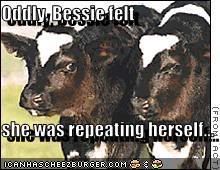SEOUL, South Korea - Tens of thousands of South Koreans rallied Saturday night against a government decision to import U.S. beef in the largest demonstration in a month of almost daily protests.Oh, c'mon! Our beef is totally safe! Totally! Tot.. ah ...
A crowd estimated by police at 38,000 people filled a plaza in front of city hall. Protesters lit candles, waved placards and chanted slogans criticizing President Lee Myung-bak.
South Korea agreed in April to reopen what was formerly the third-largest overseas market for U.S. beef. It had been shut for most of the past 4 1/2 years following the first U.S. case of mad cow disease in a Canadian-born cow in Washington state in 2003.
That deal, coupled with some sensational media reports, sparked fears of mad cow disease and triggered protests calling for scrapping or renegotiating the agreement.
WASHINGTON (AP) -- The Bush administration on Friday urged a federal appeals court to stop meatpackers from testing all their animals for mad cow disease, but a skeptical judge questioned whether the government has that authority.Ah... hmm: (my bold)
TUESDAY May 13, 2008 (foodconsumer.org) -- The Bush administration on Friday asked a federal appeals court to stop meatpackers from testing all their animals for mad cow disease, USA Today reports.HhhhooooOOokaaayyy... my confidence is a bit shaken but maybe there's not that many mad cows out there. There shouldn't be any other concerns, right?: (my bold)
A low court ruled early that Kansas-based Creekstone Farms Premium Beef can conduct mad cow disease testing in all animals. The company pursues the testing to meet the demand from foreign markets like Japan, which requires the testing for every domestic cow.
But the United States Department of Agriculture strongly opposed such a testing saying meatpackers have no right to such a testing. And it also said such a testing would undermine consumers’ confidence in domestic beef safety.
Creekstone Farms sued the government and won the first round in a low court.
In May 2007, Consumer Unions wrote to the USDA asking the agency not to appeal the March 29, 2007 low court ruling. Regardless, the government appealed to a federal appeals court to block the low court’s ruling that allows the meatpacker to conduct the test.
In the United States, less than 1 % of slaughtered cows are tested for mad cow disease under the USDA guidelines, according to USA Today. USDA argued that widespread testing does not guarantee food safety and could cause false positive results that scare consumers.
Milk and meat from cloned cows could hit grocery shelves in a few years if the FDA approves the process soon, as is expected.Riot, South Koreans!! Go! Go!
But would the products be safe? Scientists and consumer advocates disagree on the answer.
The Food and Drug Administration has been wrestling for more than five years with the question of whether or not to allow the use of milk or meat from cloned cows, swine and sheep, with a voluntary ban on such products in place for now. Cloning companies and many scientists say the products are safe to eat, while consumer advocacy groups argue there are unaddressed concerns.
Several researchers told LiveScience that the FDA approval is inevitable. The Wall Street Journal reported last week that it could come as soon as this week.
But milk and meat from cloned animals is unlikely to hit grocery store shelves for a few years. Clones must grow up before products from them can be used. And since creating them is expensive, they will likely be used for breeding, not for direct consumption, experts say.
Cloning concerns
Reports of abnormalities, higher disease susceptibility and early deaths of clones have prompted many of the concerns about using their milk and meat. (Dolly, the sheep that was the first animal cloned by this process, was euthanized at the early age of six, though scientists at the institute that created her stated the disease she was suffering from was unrelated to her being a clone.)

crossposted at American Street
No comments:
Post a Comment